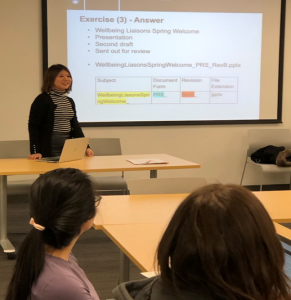Guest post by Arika Keneko, iSchool Student, UBC
Over the summer of 2019, I embarked on a three-month internship with the Records Management Office (RMO) here at UBC. I chose an internship because I wanted hands-on experience in policy development and I hoped to increase my electronic records management know-how. One of my key tasks with the RMO was to work on information governance projects called “Digital Readiness.” The goal is to improve UBC units’ electronic records management practices starting with their documentation.
I was glad to get the chance to use my professional training and be mentored at the same time.

Arika Kaneko Leading File Naming Workshop
I set up working groups with members from each unit undertaking Digital Readiness. I analyzed their department’s structure and functions, participated in spirited discussions with the group (which took a little getting used to for me), created the documentation including: unit-level policy, clear naming conventions, scanning procedures, file plan and retention schedules, responsibility and access security matrices and finally, and with a real feeling of accomplishment, obtained approval for the governance documentation. Creating documentation helps to improve practice.
I learned that the soft skills of negotiation and flexibility are important tools for both records managers and end-users.
One of my favourite tasks in this process was leading file naming convention workshops. At the UBC School of Information I learned records management theory, but wondered how to translate these skills into the day-to-day realities of records creators. The workshops brought me face-to-face with the application. Did I really understand the principles of the standardized naming convention and could I relay that information confidently to the end-user? I challenged myself during the workshops and received both positive and negative feedback from staff. A key takeaway for me was the rules records management professionals are trained to adhere to do not necessarily match end-users needs or workflows. Staff who have made up their own methods are sometimes resistant to changing their behaviour. I learned that the soft skills of negotiation and flexibility are important tools for both records managers and end-users. For example, I never thought I would have to argue the merits of an underscore in a filename over the use of a space! Using an underscore instead of a space to reduce character spaces seemed straightforward to me, some people reacted negatively to such a change while others were totally keen to have clear and concise guidance tailored to their own records context. Both positions were useful for me to hear and respond to. Conducting workshops was an excellent way for the units to get used to the naming conventions by practicing as a group and for me as a professional to receive feedback from them.
Creating documentation helps improve practice.
Coming from the School of Information, I was genuinely surprised with the variety of records order within UBC units. Some were well organized and some needed more guidance. Welcome to the real world! I was glad to get the chance to apply my training and be mentored at the same time. My experience interning with the Records Management Office was valuable in that it gave my iSchool training real world context. It provided me policy experience and developed and honed my negotiation and flexibility skills. Thanks RMO!